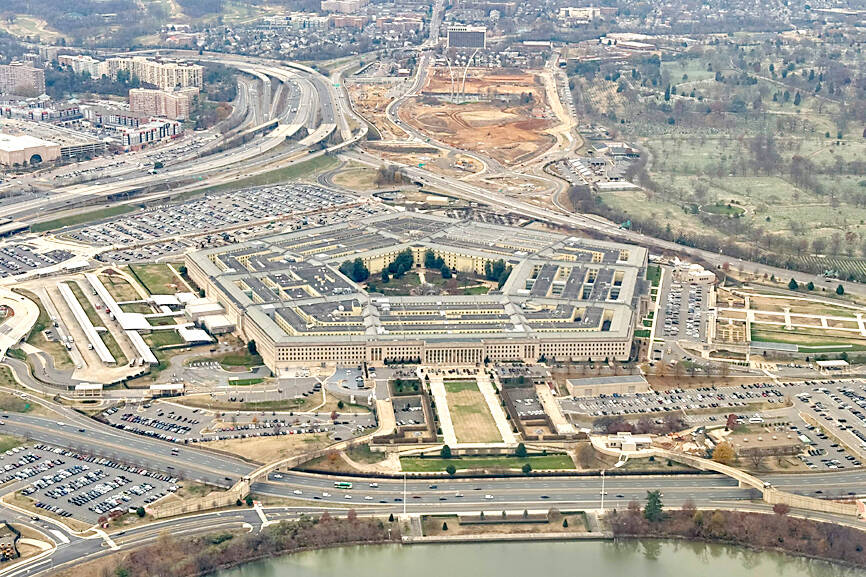China increased its military pressure on Taiwan last year and took other steps in preparation for a potential invasion, an annual report published by the US Department of Defense on Wednesday showed.
“Throughout 2023, Beijing continued to erode longstanding norms in and around Taiwan by employing a range of pressure tactics against Taiwan,” the report said, which is titled “Military and Security Developments Involving the People’s Republic of China (PRC) 2024.”
The Chinese People’s Liberation Army (PLA) “is preparing for a contingency to unify Taiwan with the PRC by force, if perceived as necessary by Beijing, while simultaneously deterring, delaying or denying any third-party intervention on Taiwan’s behalf,” the report said.

Photo: Daniel Slim, AFP
Beijing has “a range of options to coerce Taipei” based on the PLA’s “increasing capabilities in multiple domains,” it said.
These include an air and maritime blockade, military actions, precision missile and airstrikes, the seizure of Taiwan’s small outlying islands and a large-scale amphibious invasion of Taiwan proper, it added.
An amphibious invasion would be “one of the most complicated and difficult military operations for the PLA” and would “likely strain the PRC’s armed forces and invite a strong international response,” but it had conducted “realistic, large-scale” amphibious assault training last year that was “almost certainly aimed at supporting a Taiwan invasion scenario,” the report said.
Although there is no indication that China is expanding its fleet of tank landing ships and medium-sized landing craft at this time, the PLA probably assesses that it already has sufficient amphibious capacity or believes that its shipbuilding capacity can produce the necessary shore-to-shore connectors relatively quickly, it said.
The report also said that China’s navy transferred many of its land-based aircraft, including 300 fighter jets, to its air force last year, so that the navy could “focus on improving carrier-based air operations.”
In addition, the PLA’s rocket force increased its presence along the Taiwan Strait with new missile battalions last year and “is prepared to conduct missile attacks” in an attempt to “degrade Taiwan’s defenses, neutralize Taiwan’s leadership or break the public’s will to fight,” it said.
The report also detailed how Taiwan is “taking steps to address the military threat posed by the PLA,” such as by building war reserve stocks, growing its defense-industrial base, improving joint operations and crisis response capabilities, and strengthening its officer and noncommissioned officer corps.
Minister of National Defense Wellington Koo (顧立雄) yesterday told reporters that “Taiwan has the determination, ability and strength to enhance its self-defense capabilities and deter reckless moves by China.”
China’s military expansion is threatening regional peace and stability, he said, adding that Beijing has aroused concerns in the region and countries in the Indo-Pacific and Europe are holding more military exercises to bolster regional security and avoid conflict in the Taiwan Strait or the Indo-Pacific region.

AIR SUPPORT: The Ministry of National Defense thanked the US for the delivery, adding that it was an indicator of the White House’s commitment to the Taiwan Relations Act Deputy Minister of National Defense Po Horng-huei (柏鴻輝) and Representative to the US Alexander Yui on Friday attended a delivery ceremony for the first of Taiwan’s long-awaited 66 F-16C/D Block 70 jets at a Lockheed Martin Corp factory in Greenville, South Carolina. “We are so proud to be the global home of the F-16 and to support Taiwan’s air defense capabilities,” US Representative William Timmons wrote on X, alongside a photograph of Taiwanese and US officials at the event. The F-16C/D Block 70 jets Taiwan ordered have the same capabilities as aircraft that had been upgraded to F-16Vs. The batch of Lockheed Martin

GRIDLOCK: The National Fire Agency’s Special Search and Rescue team is on standby to travel to the countries to help out with the rescue effort A powerful earthquake rocked Myanmar and neighboring Thailand yesterday, killing at least three people in Bangkok and burying dozens when a high-rise building under construction collapsed. Footage shared on social media from Myanmar’s second-largest city showed widespread destruction, raising fears that many were trapped under the rubble or killed. The magnitude 7.7 earthquake, with an epicenter near Mandalay in Myanmar, struck at midday and was followed by a strong magnitude 6.4 aftershock. The extent of death, injury and destruction — especially in Myanmar, which is embroiled in a civil war and where information is tightly controlled at the best of times —

China's military today said it began joint army, navy and rocket force exercises around Taiwan to "serve as a stern warning and powerful deterrent against Taiwanese independence," calling President William Lai (賴清德) a "parasite." The exercises come after Lai called Beijing a "foreign hostile force" last month. More than 10 Chinese military ships approached close to Taiwan's 24 nautical mile (44.4km) contiguous zone this morning and Taiwan sent its own warships to respond, two senior Taiwanese officials said. Taiwan has not yet detected any live fire by the Chinese military so far, one of the officials said. The drills took place after US Secretary

THUGGISH BEHAVIOR: Encouraging people to report independence supporters is another intimidation tactic that threatens cross-strait peace, the state department said China setting up an online system for reporting “Taiwanese independence” advocates is an “irresponsible and reprehensible” act, a US government spokesperson said on Friday. “China’s call for private individuals to report on alleged ‘persecution or suppression’ by supposed ‘Taiwan independence henchmen and accomplices’ is irresponsible and reprehensible,” an unnamed US Department of State spokesperson told the Central News Agency in an e-mail. The move is part of Beijing’s “intimidation campaign” against Taiwan and its supporters, and is “threatening free speech around the world, destabilizing the Indo-Pacific region, and deliberately eroding the cross-strait status quo,” the spokesperson said. The Chinese Communist Party’s “threats